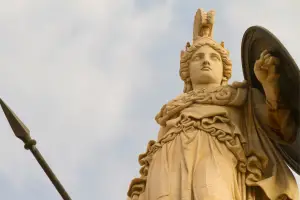Symbols have been used by people of all cultures since the dawn of time to communicate, express ideas and record information. In many ancient civilizations, symbols carried special meanings and often represented a connection between the human realm and the divine world. The symbolism of wisdom is particularly significant in many cultures. It can represent knowledge, insight and understanding, as well as spiritual enlightenment and divine inspiration.
In this blog post, we’ll explore the symbolism of wisdom in ancient cultures and examine its meaning and significance. We’ll look at how it relates to spirituality, religion, and philosophy, as well as the lessons it can teach us today.
Symbolism of Wisdom

Wisdom is a prized attribute that people have valued throughout the ages. It is a quality that is often associated with experience, insight, and good judgment. In many cultures, wisdom is considered to be a divine quality, and various symbols have been used to represent this important concept.
Ancient symbols have been used to convey hidden messages and to represent ideas that may not be apparent at first glance. In many cultures, wisdom is considered to be a divine quality, and various symbols have been used to represent this important concept.
Understanding the meanings and significance of ancient symbols can help us to better understand the world around us and to tap into the power of wisdom that lies within each of us. The symbols of wisdom represent important concepts such as knowledge, enlightenment, and inner awareness. By exploring the symbolism of wisdom, we can gain a deeper understanding of ourselves and the world around us.
The Symbolism of the Owl

One of the most famous symbols of wisdom is the owl, which has been used to represent wisdom in many cultures. In ancient Greek mythology, the owl was associated with Athena, the goddess of wisdom. The owl’s silent flight and keen eyesight made it a sacred bird, representing the goddess’s broad knowledge and self-awareness. In Egyptian mythology, the owl was considered a symbol of magical powers, representing the extensive knowledge of the moon god. In the Shinto religion, the owl was associated with the goddess of wisdom and fertility, conveying hidden messages to those who were receptive to its silent nature.
The Symbolism of the Lotus Flower
Another important symbol of wisdom is the lotus flower, which is considered a powerful symbol of enlightenment, wisdom, and spiritual growth in many cultures. In ancient Egyptian religion, the lotus flower represented the life force and was associated with the goddess Isis, who was believed to have the power to resurrect the dead.
In Hinduism, the lotus flower symbolizes knowledge, purity, and divine messages. In Buddhism, the lotus flower is used as a metaphor for the journey towards enlightenment, with the flower representing the ability to rise above the muck and mire of everyday life. MAny ancient cultures saw the lotus flower as a symbol of fertility, representing new life and spiritual growth.
The Symbolism of the Tree
The tree is another important symbol of wisdom, representing strength, grounding, and stability. In many cultures, the tree is seen as a guardian of knowledge, with its branches providing shelter from the storms of life. In Celtic mythology, the tree is considered to represent eternal life, with its roots connecting us to our past and its branches reaching up into the heavens.
In Norse mythology, the tree was seen as a symbol of protection, representing safety and security for those who inhabit it. In ancient Egyptian religion, the tree represented the power of nature and was associated with Nut, the goddess of the sky.
The Symbolism of the Wisdom Knot
The wisdom knot is an important symbol of wisdom in many cultures, particularly in ancient China. The wisdom knot is also known as the endless knot, and it is a symbol that represents the ultimate knowledge of the universe. The knot symbolizes the interconnectedness of all things and represents the wisdom that comes from the understanding of the unity of all things. In Japanese mythology, the wisdom knot is considered a powerful symbol of self-awareness and the attainment of inner knowledge.
The Symbolism of the Greek Goddess Athena

In Ancient Greece, the goddess Athena was considered the embodiment of wisdom, knowledge, and strategic warfare. She was considered the patron of heroes and was believed to be the protector of the city of Athens. Athena was often depicted with an owl, which was seen as a symbol of her wisdom and ability to see in the dark. The owl was also considered a symbol of the goddess’s silent wisdom and her ability to convey hidden messages to those who were receptive to her message.
The Symbolism of the Philosopher’s Stone
Philosopher’s stone, in the western world, this symbol represents the ultimate knowledge and the attainment of wisdom. The philosopher’s stone is a mythical stone that was believed to have the power to turn base metals into gold, and to grant eternal life. In ancient times, the philosopher’s stone was considered a symbol of secret knowledge and was used by many secret societies to represent the attainment of ultimate knowledge and wisdom.
The Symbolism of the Woman’s Head
The woman’s head is a symbol that is often used to represent wisdom and knowledge. In many cultures, the woman’s head is considered a symbol of the subconscious mind and the deep inner knowledge that resides within each person. The woman’s head is often depicted with a veil or a hood, which represents the hidden wisdom that lies within each person.
Conclusion: Symbolism of Wisdom
In conclusion, symbols of wisdom have been used in many cultures throughout history to represent important ideas and concepts. These symbols convey a deeper meaning and can convey hidden messages to those who are receptive to them. From the owl to the lotus flower, the wisdom knot to the philosopher’s stone, symbols of wisdom are representations of inner knowledge and self-awareness that can be used to gain insight into life. These symbols can also be a way for people to access their own hidden wisdom and use it in their day-to-day lives.
Other suggested articles:

